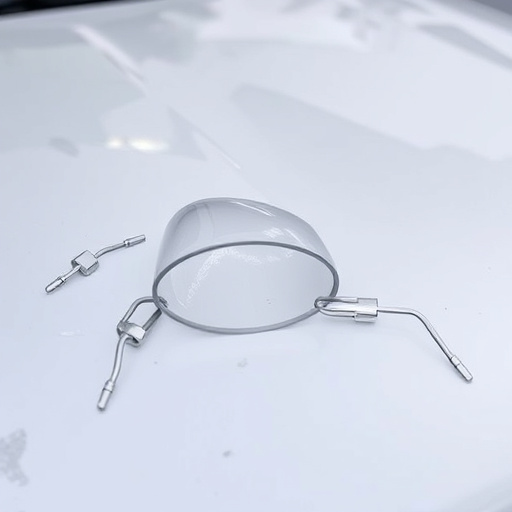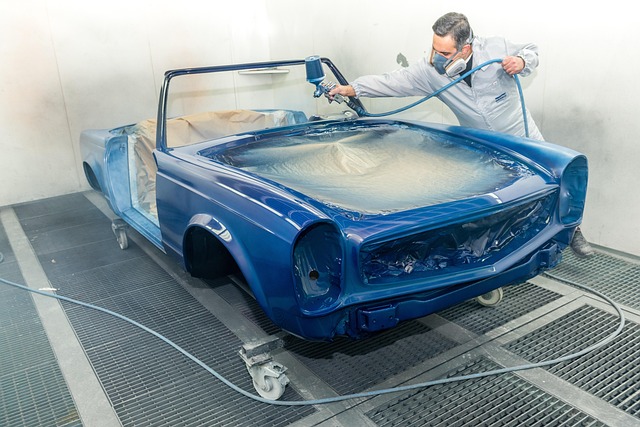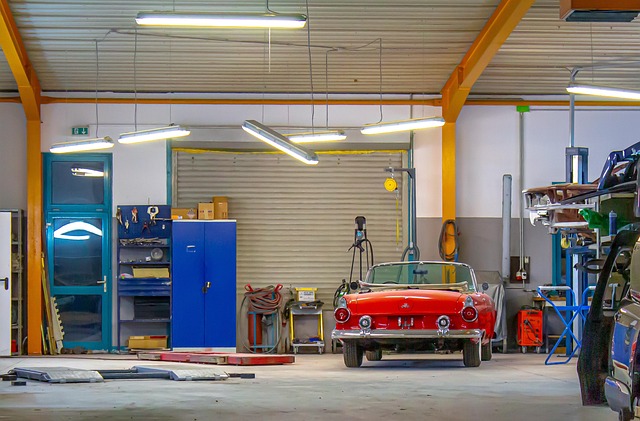The automotive industry is transitioning to eco-friendly materials for new auto body panels due to environmental concerns and consumer demand for sustainability. Advanced composites from natural fibers like bamboo or hemp offer superior strength, weight reduction, and lower carbon footprints compared to traditional steel and fiberglass. Bio-based plastics provide aesthetic flexibility and high recyclability, contributing to a circular economy. These innovations aim to minimize waste, resource depletion, and carbon emissions throughout vehicle construction and repair processes, offering long-term cost savings and durability benefits for auto collision centers and repair services. The future of green car manufacturing looks promising with advancements in recycled and bio-based composite materials and recycling technologies.
In today’s eco-conscious world, the automotive industry is undergoing a green revolution. New auto body panels are being developed with an eye towards sustainability, offering a range of innovative and eco-friendly options. This article explores the latest advancements in materials science, highlighting the benefits of using sustainable panels for both consumers and the environment. We also delve into future trends, providing insights into how green car manufacturing is poised to shape the automotive landscape.
- Innovations in Eco-Friendly Auto Body Materials
- Benefits of Using Sustainable Panels
- Future Trends in Green Car Manufacturing
Innovations in Eco-Friendly Auto Body Materials

The automotive industry is witnessing a significant shift towards eco-friendly materials for new auto body panels, driven by growing environmental concerns and consumer demand for sustainable options. Traditional steel and fiberglass have long been the go-to choices for vehicle construction due to their strength and durability. However, newer alternatives are now gaining traction thanks to innovations in material science and recycling technologies. These include advanced composites made from natural fibers like bamboo or hemp, which offer excellent structural integrity while significantly reducing weight and carbon footprint.
Another notable trend is the use of bio-based plastics derived from renewable resources such as cornstarch or sugarcane. These materials can be molded into complex shapes, providing designers with more freedom in aesthetics. Moreover, they are highly recyclable and can contribute to a circular economy, where damaged new auto body panels from fender benders or vehicle collision repair can be reclaimed, processed, and reused, thereby minimizing waste and resource depletion during scratch repair processes.
Benefits of Using Sustainable Panels

The shift towards sustainability in the automotive industry has led to a significant advancement in new auto body panels. These eco-friendly alternatives offer a range of benefits, from reduced environmental impact to enhanced safety and durability. One notable advantage is their construction using recycled materials, which diminishes the carbon footprint associated with traditional manufacturing processes. This approach not only conserves natural resources but also contributes to a greener planet.
Moreover, sustainable panels often prove more cost-effective in the long run. Their superior resistance to corrosion and impact damage means they require less frequent replacement, thereby saving money on repairs. For instance, advanced composites made from plant fibers or recycled plastics can withstand car dent removal processes better than conventional metal panels, ensuring a longer lifespan for vehicles. This trend benefits auto collision centers and automotive repair services by offering high-quality, long-lasting solutions to customers.
Future Trends in Green Car Manufacturing

The future of green car manufacturing is bright, with a growing emphasis on sustainable materials and production methods. As technology advances, we can expect to see more new auto body panels made from recycled or bio-based materials, reducing the environmental impact of vehicle production. Innovations in composite materials, such as those derived from plants or agricultural waste, offer promising alternatives to traditional petroleum-based plastics. These eco-friendly options not only reduce carbon emissions but also enhance vehicle durability and design flexibility.
Additionally, advancements in recycling technologies are enabling more efficient reuse of auto body panels, promoting a circular economy in the automotive sector. With increased consumer demand for sustainable transportation, manufacturers are investing heavily in developing environmentally conscious production processes, including closed-loop recycling systems. This shift towards green manufacturing practices is not just a trend but a necessary step to create a more sustainable future for both vehicle restoration and new auto body panel production, ultimately contributing to a greener planet through every journey taken on the road.
The shift towards eco-friendly options in new auto body panels is not just a trend but a necessary evolution. Innovations in materials, such as recycled plastics and advanced composites, offer sustainable alternatives with reduced environmental impact. The benefits are clear: lighter weights leading to improved fuel efficiency, decreased manufacturing waste, and lower emissions. As the automotive industry continues to embrace green manufacturing trends, consumers can look forward to a future where their vehicles not only run on clean energy but are also made from it.














